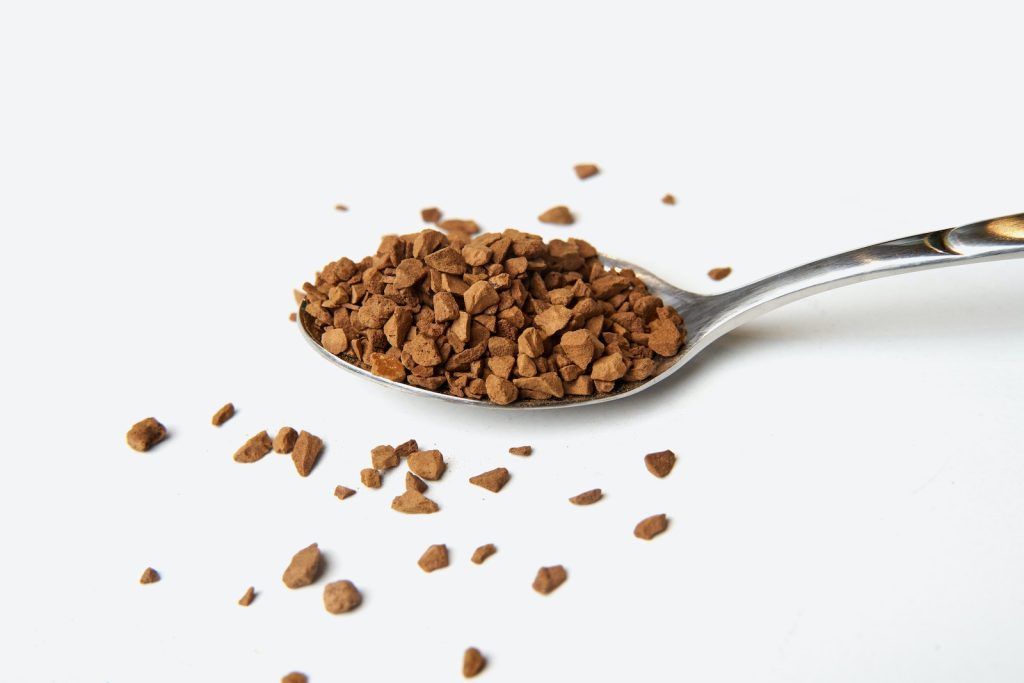Have you ever wanted to make a cup of instant coffee, but you didn’t want to wait for the water to boil? Well, the answer to your dilemma may be simpler than you think.

You can use cold water for instant coffee, though it’s important to understand the pros and cons of this brewing method. You’ll also need to know how to make the perfect cup.
In this article, we’ll explore why cold water can be used for instant coffee, as well as alternatives to cold water for making instant coffee. So, read on to learn how you can make a delicious cup of instant coffee without waiting for the water to boil.
The Pros and Cons of Using Cold Water for Instant Coffee
Imagine taking a refreshing sip of iced coffee on a hot summer day – that’s the benefit of using cold water to make instant coffee. Cold brewing is a great way to make a cup of coffee that’s both convenient and delicious.
When you use cold water, the flavor profiles of the coffee grounds are extracted differently, resulting in a less bitter taste. This makes it perfect for those who prefer a milder cup of coffee. The cold brew process also takes longer, but the result is smoother and more flavorful coffee.
Another benefit of using cold water for instant coffee is that it’s a healthier way to make coffee. By using cold water, you can avoid the harmful effects of boiling water on the coffee grounds, which can destroy some of the beneficial compounds.
This makes it easier to get a cup of coffee that’s full of antioxidants and other beneficial compounds. Cold water also reduces the acidity of the coffee, which makes it easier to digest and can help with stomach issues.
Tips for Making the Perfect Cup
Crafting the perfect cup of coffee requires more than just the right ingredients; it calls for a creative and thoughtful approach.
When it comes to making instant coffee with cold water, the key factor in creating a great brew is to choose the right type of instant blend. Different types of instant coffee will vary in strength, flavour, and texture, so it’s important to select the right one for your desired outcome.
Different brewing methods can also have an effect on the final result. Cold water brewing is usually done with a French press, and this method will yield a bolder and more intense cup of coffee. If you prefer a milder coffee, you can opt for a simple pour-over method.
Both of these methods will ensure that your coffee is brewed correctly and with the right balance of flavour and strength. No matter which method you choose, the most important thing is to enjoy the process of crafting your perfect cup!
Alternatives to Cold Water for Instant Coffee
Discovering alternatives to cold water for making instant coffee can unlock a whole new world of flavors and textures. For example, a recent study found that adding a bit of milk to your instant coffee can double the number of aromatic compounds in your cup.
But if you’re looking for a more adventurous experience, why not try some of the other brewing methods? You can use hot water, or even microwave heating, to create a unique flavor profile. The key is to experiment with different combinations and see what works best for you.
Not only will you get to explore the world of instant coffee, but you’ll also get to discover a range of new and delicious flavor combinations. With a little bit of experimentation, you can unlock the delicious secrets of instant coffee brewing and enjoy a cup of coffee that’s tailored to your personal tastes.
Frequently Asked Questions
What type of instant coffee is best to use with cold water?
Brewing instant coffee with cold water can be a great way to enjoy your favorite cup of coffee without having to wait for it to brew. There are a few different techniques you can use to get the best flavor out of your instant coffee when using cold water.
Each technique offers different flavor variations, so you can experiment to find the one you like best. For instance, if you want a bolder flavor, you can let the coffee grounds steep in cold water overnight. If you prefer a smoother, lighter flavor, you can use cold water and a French press.
Cold-brewing instant coffee also allows you to enjoy the flavor without the bitterness that often comes with hot-brewed coffee. Whatever technique you choose, you’re sure to find a delicious cup of instant coffee with cold water.
How much cold water should I use for my instant coffee?
When it comes to making instant coffee with cold water, the key is to find the right balance between the two. Depending on the type of instant coffee you use, you’ll want to adjust the amount of cold water accordingly.
For example, if you’re using a lighter instant coffee, you’ll want to use more cold water to bring out the full flavor. However, if you’re using a stronger instant coffee, you’ll want to use less cold water to avoid bitterness. Experimenting with different brewing methods and cold water amounts can help you find the perfect cup of instant coffee.
The flavor differences between each cup can be quite remarkable!
Is cold water coffee healthier than hot water coffee?
You may have heard the adage, “cold water coffee is smoother than hot water coffee.” There is some truth to this when it comes to cold brewing, iced coffee, and instant coffee.
Cold brewing is a method of making coffee by steeping grounds in cold water for several hours, which produces coffee with a smoother and less acidic taste.
Iced coffee is made from hot brewed coffee that is chilled and served over ice.
Instant coffee is made by adding hot or cold water to pre-made coffee grounds or powder. Cold water is often used when making instant coffee because it dissolves the powder more quickly, creating a smoother cup of coffee.
Cold water instant coffee is not necessarily healthier than hot water instant coffee, as both contain the same amount of caffeine. However, cold water coffee does have a smoother taste and can be more refreshing on a hot day.
Does using cold water result in a different taste than hot water?
Making a great cup of coffee is all about personal preference and your own brewing techniques. When it comes to using cold water for coffee, it will affect the flavor profile and taste preferences.
Cold brewing will result in a different flavor profile than hot water brewing, as it extracts the flavors and oils at a slower rate. This slower extraction process results in a smoother, less acidic taste with more subtle flavor notes.
Whether you choose to use cold or hot water for your coffee, it all comes down to personal preference. Experiment with different techniques and temperatures to find the perfect flavor profile for you.
Does the temperature of the water affect the caffeine content of the coffee?
Using cold water to brew coffee has become very popular in recent years. While most people think that cold brewing just involves using cold water, it can actually involve using cold or room temperature water to steep coffee grounds for an extended period of time. While cold brewing can result in a milder tasting cup of coffee, the temperature of the water does not affect the caffeine content of the coffee. Cold brewing does not extract as much caffeine from the coffee grounds as hot water does. So, the resulting cup of cold brewed coffee will have less caffeine than a cup of coffee made with hot water.
Conclusion
Cold water may not be the ideal way to make instant coffee, but it certainly does the job in a pinch. It’s a quick and easy solution that can give you the jolt of caffeine you need to power through your day.
Making a cup with cold water is like trying to thread a needle with an elephant; it can be done, but it’s not always easy. Although it can be tricky to get the balance of flavor right, with a bit of patience and practice, you can make a cup of cold water instant coffee that tastes great.
So don’t be afraid to give it a try!
